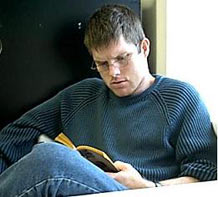 Sunday, March 19, 2006
Sunday, March 19, 2006
World Premieres?
Recently, I read an article (I can't remember where, NY Times, Newmusicbox, one of several blogs...) which discussed the idea of world premiere performances and when is a performance an actual "world premiere."
Is the world premiere the initial performance? Does it occur during the performances which occasionally take place before the big Thursday Night Symphony concert? Is it the big Thursday night Symphony concert? Is it during the various workshops where a work can be played numerous times before the big concert?
I know of one instance where a piece was performed multiple times before the "world premiere". Charles Wuorinen composed The Haroun Piano Book for pianist Lynn Raley who resides in Jackson, Mississippi. Mr. Raley performed the work several times while on a concert tour which lead up to the "world premiere" performance in New York City.
Is this common practice?
I guess so. Or at least more widespread than I once thought.
Now I have another instance (or two) where this has happened (or in the process of happening) with one of my works. Coming up Friday there will be a performance of my Figment No. 3 "Euterpe" for solo flute at a local coffee house. (See Al Theisen's latest post.) I guess it can be called a "sneak peek" since the actual world premiere is scheduled for May 6 at our local new music festival.
A similar thing has happened for another work of mine. My Canon In Memoriam Iannis Xenakis for Saxophone Quartet (2002) had its first performance at a private birthday recital for my former saxophone professor and it hasn't been performed since. I have chosen to call the upcoming performance on March 31 the "world premiere".
Can a composer save the actual "world premiere" performance for another date and venue? Would that be like our federal government and the difference between actual and observed holidays?
posted by Everette Minchew
5:28 PM
|
|
 Composer Everette Minchew (born 1977) is consistently active in the creation, performance, and promotion of contemporary music. Moderately prolific, his catalogue includes small chamber pieces for violin, piano, various wind instruments, harpsichord and electronic music. Current commissions include a string trio and an opera based on an 11th-century crusades tale.
His earliest musical training came at the age of eleven when he began playing alto saxophone; it wasn’t long until he began his first attempts in composition.
Composer Everette Minchew (born 1977) is consistently active in the creation, performance, and promotion of contemporary music. Moderately prolific, his catalogue includes small chamber pieces for violin, piano, various wind instruments, harpsichord and electronic music. Current commissions include a string trio and an opera based on an 11th-century crusades tale.
His earliest musical training came at the age of eleven when he began playing alto saxophone; it wasn’t long until he began his first attempts in composition.
He received a Bachelor’s Degree in Music History from the University of Southern Mississippi, where he studied saxophone under world-renowned soloist, Lawrence Gwozdz.
Fearing that traditional university training would hinder his development as a progressive composer, he abandoned the idea of formal lessons in favor of an intense private study of modern masterworks.
Minchew's works are characterized by their intense timbral explorations and brutal dissonance. That is not to say, however, that the compositions are devoid of beauty. In the first of the Two Brief Pieces, for example, the harpsichord chimes stringent yet haunting chords evoking a sense of loss.
Other pieces, like the Figment No. 2 "Juggler's Fancy" play upon the kaleidoscopic interaction between timbres and tones. The rapid alternation of pizzicato, arco bowing, and extreme glissandi remind the listener of Xenakis coupled with a Berio Sequenza. Minchew's Invention "Two-Part Contraption" for piano owes much to Ligeti's etudes and boogie-woogie jazz.
His music has been performed around the United States, and he was the featured composer at the 2005 Intégrales New Music Festival in Hattiesburg, Mississippi.
He currently resides in Hattiesburg, Mississippi with his wife, Cheryl.
CONTACT INFORMATION
| |



